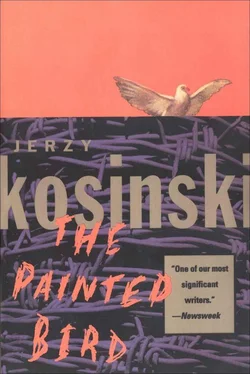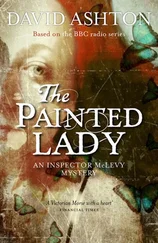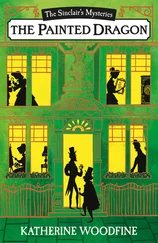Jerzy Kosiński - The Painted Bird
Здесь есть возможность читать онлайн «Jerzy Kosiński - The Painted Bird» весь текст электронной книги совершенно бесплатно (целиком полную версию без сокращений). В некоторых случаях можно слушать аудио, скачать через торрент в формате fb2 и присутствует краткое содержание. Год выпуска: 1965, ISBN: 1965, Жанр: Детская проза, на английском языке. Описание произведения, (предисловие) а так же отзывы посетителей доступны на портале библиотеки ЛибКат.
- Название:The Painted Bird
- Автор:
- Жанр:
- Год:1965
- ISBN:978-0-8021-9575-3
- Рейтинг книги:4 / 5. Голосов: 1
-
Избранное:Добавить в избранное
- Отзывы:
-
Ваша оценка:
- 80
- 1
- 2
- 3
- 4
- 5
The Painted Bird: краткое содержание, описание и аннотация
Предлагаем к чтению аннотацию, описание, краткое содержание или предисловие (зависит от того, что написал сам автор книги «The Painted Bird»). Если вы не нашли необходимую информацию о книге — напишите в комментариях, мы постараемся отыскать её.
The Painted Bird — читать онлайн бесплатно полную книгу (весь текст) целиком
Ниже представлен текст книги, разбитый по страницам. Система сохранения места последней прочитанной страницы, позволяет с удобством читать онлайн бесплатно книгу «The Painted Bird», без необходимости каждый раз заново искать на чём Вы остановились. Поставьте закладку, и сможете в любой момент перейти на страницу, на которой закончили чтение.
Интервал:
Закладка:
Her piercing shrieks caused pandemonium in the yard. The terrified rabbits went mad in their hutches, the excited females trampled their young, the males fought one another, squealing, hitting their rumps on the walls. Ditko was jumping and straining at his chain. The hens flapped their wings in a desperate attempt to fly away and then collapsed, resigned and humiliated, in the tomatoes and onions.
The rabbit, now completely red, was still running. She dashed through the grass, then returned to the hutches; she tried to struggle through the bean patch. Each time her loose hanging skin caught on some obstacle she halted with a horrid scream and spurted blood.
Makar rushed out of the house finally with an ax in his hand. He ran after the bloody creature and split it in two with one blow. Then he hit the heap of gore again and again. His face was pale yellow and he bellowed horrible curses.
When only a bloody pulp remained of the rabbit, Makar noticed me and came toward me quivering with rage. I did not have time to dodge and a powerful kick in the stomach sent me breathless over the fence. The world seemed to swirl. I was blinded as if my own skin were falling over my head in a black hood.
The kick immobilized me for several weeks. I lay in an old rabbit hutch. Once a day Quail or Ewka brought me some food. Sometimes Ewka came alone, but left without a word when she saw my condition.
One day Anulka, who heard about my injuries, brought me a live mole. She tore it apart before my eyes and applied it to my abdomen until the animal’s body turned quite cold. When she finished she was confident that her treatment would make me well quite soon.
I missed Ewka’s presence, her voice, her touch, her smile. I tried to get better rapidly, but will power alone was not sufficient. Whenever I tried to stand, a spasm of pain in my belly paralyzed me for minutes. Crawling out of the hutch to urinate was sheer agony, and I often gave up and did it where I slept.
Finally Makar himself looked in and told me that if I did not return to work within two days he would hand me over to the peasants. They were about to deliver some quotas to the railroad station and would gladly turn me over to the German military police.
I began to practice walking. My legs did not obey me and I tired easily.
One night I heard noises outside. I peered through a slot between the boards. Quail was leading the he-goat to his father’s room, where an oil lamp burned dimly.
The he-goat was seldom taken out. He was a large, stinking animal, fierce and afraid of no one. Even Ditko preferred not to take him on. The he-goat attacked hens and turkeys and butted his head against fences and tree trunks. Once he chased me, but I hid in the rabbit hutches until Quail led him away.
Intrigued by this unexpected visit to Makar’s room, I climbed onto the roof of the hutch, from where I could see into the hut. Soon Ewka came into the room, huddled in a sheet. Makar approached the buck and stroked its under-belly with birch twigs until the animal became sufficiently aroused. Then with a few light blows of the stick he forced the beast to stand up, resting his forelegs on a shelf. Ewka tossed off her sheet and, to my horror, naked she slipped under the goat, clinging to it as though it were a man. Now and then Makar pushed her aside and excited the animal still more. Then he let Ewka couple passionately with the buck, gyrating, thrusting, and then embracing it.
Something collapsed inside me. My thoughts fell apart and shattered into broken fragments like a smashed jug. I felt as empty as a fish bladder punctured again and again and sinking into deep, muddy waters.
All these events became suddenly clear and obvious. They explained the expression I had often heard people use about people who were very successful in life: “He is in league with the Devil.”
Peasants also accused one another of accepting help from various demons, such as Lucifer, Cadaver, Mammon, Exterminator, and many others. If the powers of Evil were so readily available to peasants, they probably lurked near every person, ready to pounce on any sign of encouragement, any weakness.
I tried to visualize the manner in which the evil spirits operated. The minds and souls of people were as open to these forces as a plowed field, and it was on this field that the Evil Ones incessantly scattered their malignant seed. If their seed sprouted to life, if they felt welcomed, they offered all the help which might be needed, on the condition that it would be used for selfish purposes and only to the detriment of others. From the moment of signing a pact with the Devil, the more harm, misery, injury, and bitterness a man could inflict on those around him, the more help he could expect. If he shrank from inflicting harm on others, if he succumbed to emotions of love, friendship, and compassion, he would immediately become weaker and his own life would have to absorb the suffering and defeats that he spared others.
These creatures that inhabited the human soul observed keenly not only man’s every action, but also his motives and emotions. What mattered was that a man should consciously promote evil, find pleasure in harming others, nurturing and using the diabolical powers granted him by the Evil Ones in a manner calculated to cause as much misery and suffering around him as possible.
Only those with a sufficiently powerful passion for hatred, greed, revenge, or torture to obtain some objective seemed to make a good bargain with the powers of Evil. Others, confused, uncertain of their aim, lost between curses and prayers, the tavern and the church, struggled through life alone, without help from either God or the Devil.
So far I had been one of those. I felt annoyed with myself for not having understood sooner the real rules of this world. The Evil Ones surely picked only those who had already displayed a sufficient supply of inner hatred and maliciousness.
A man who had sold out to the Evil Ones would remain in their power all his life. From time to time he would have to demonstrate an increasing number of misdeeds. But they were not rated equally by his superiors. An action harming one person was obviously worth less than one affecting many. The consequences of the evil deed were also important. Ruining the life of a young man was certainly more valuable than doing the same to an old man who hadn’t long to live anyway. Furthermore, if the wrong done to someone managed to change his character in such a way as to turn him toward evil as a way of life, then a special bonus was due. Thus, simply beating up an innocent man was worth less than inciting him to hate others. But hatreds of large groups of people must have been the most valuable of all. I could barely imagine the prize earned by the person who managed to inculcate in all blond, blue-eyed people a long-lasting hatred of dark ones.
I also began to understand the extraordinary success of the Germans. Didn’t the priest explain once to some peasants that even in remote times the Germans delighted in waging wars? Peace had never appealed to them. They did not want to till the soil, they had no patience to wait all year for the harvest. They preferred attacking other tribes and taking crops from them. The Germans probably were noticed then by the Evil Ones. Eager to do harm, they agreed to sell out wholesale to them. That is why they were endowed with all their splendid abilities and talents. That is why they could impose all their refined methods of wrongdoing on others. Success was a vicious circle: the more harm they inflicted, the more secret powers they secured for evil. The more diabolical powers they had, the more evil they could achieve.
No one could stop them. They were invincible; they performed their function with masterful skill. They contaminated others with hatred, they condemned whole nations to extermination. Every German must have sold his soul to the Devil at birth. This was the source of their power and strength.
Читать дальшеИнтервал:
Закладка:
Похожие книги на «The Painted Bird»
Представляем Вашему вниманию похожие книги на «The Painted Bird» списком для выбора. Мы отобрали схожую по названию и смыслу литературу в надежде предоставить читателям больше вариантов отыскать новые, интересные, ещё непрочитанные произведения.
Обсуждение, отзывы о книге «The Painted Bird» и просто собственные мнения читателей. Оставьте ваши комментарии, напишите, что Вы думаете о произведении, его смысле или главных героях. Укажите что конкретно понравилось, а что нет, и почему Вы так считаете.












